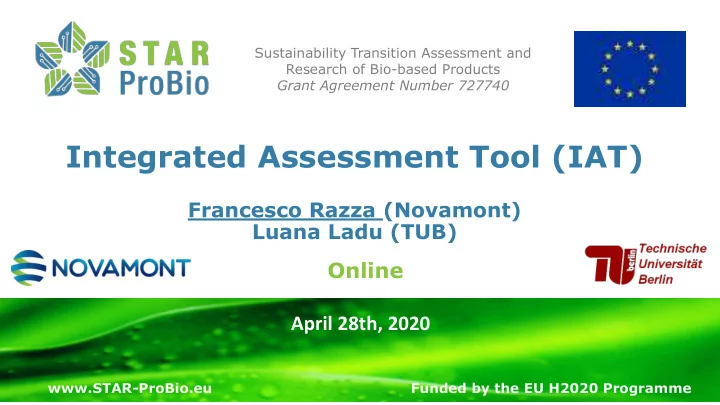

Sustainability Transition Assessment and Research of Bio-based Products Grant Agreement Number 727740 Integrated Assessment Tool (IAT) Francesco Razza (Novamont) Luana Ladu (TUB) Online April 28th, 2020 www.STAR-ProBio.eu Funded by the EU H2020 Programme
SAT-ProBio Blueprint Derivation of Principles, criteria and SAT-ProBio indicators for the sustainability assessment assessment STAR-ProBio Workpackages of the bio-based products framework blueprint “Areas of concern” for the sustainability Interpretation and integration assessment of bio-based products Integrated based on the existing Assessment Tool standards (e.g EN 16571:2016) (IAT) to be used internally by companies STAR-ProBio Criteria and Indicators for the product certification schemes Principle: Respect Labour Right Stakeholder: Workers Relevant Chain of Custody Interfaces: Biomass production, Waste and Residues, Biomass processing, Transport and Storage, EoL Criteria: Fair salary Sustainability Definition of the criteria: Homogenization and This criteria aims to assess whether practices concerning wages are in compliance with established standards and if the wage provided is meeting legal requirements, whether it is above, meeting or below industry average and whether it can be considered as a living wage. Further description: Certification Fair wage means a wage fairly and reasonably commensurate with the value of a particular service or class of Representation based on service rendered, and, in establishing a minimum fair wage for such service or class of service. Codes of conduct which deal with wages and benefits have focused on three standards when assessing level of wages: - the minimum wage required by law; - the local "prevailing industry wage"; - the "living wage" (also sometimes designated as a “ floor wage ” or “ non-poverty wage ” ). Tools (SCT) The first is obviously the easiest to accurately measure, but has been deemed inadequate in many instances certification approach because legal minimum wage has been kept artificially low in many countries to attract investment. Market- basket studies have found that, without working excessive overtime hours, the minimum wage in many countries is not sufficient to meet a worker's basic needs. The "prevailing industry wage" is an ambiguous premise. It may be higher than the required minimum or may simply meet legal requirements, but in either case this language provides no measurable guarantee that the prevailing wage is sufficient to meet a worker's basic needs. For this reason "living wage" is promoted and implemented by precursor organizations. It is a wage that enables workers and their families to meet their needs for nutritious food, water, shelter, clothing, for product certification education, healthcare and transport as well as providing for a discretionary income. It is generally higher than the minimum wage in many locations. Application and indicators: Fair wages are undoubtedly one of the most important criteria for corporate social responsibility because without fair wages the workers are not being capable to provide for their own needs and the one of their schemes families. For people to live an adequate life, a “ fair salary ” is necessary. To meet the Universal Declaration of Human Rights , a “ fair salary ” is necessary. The indicators to assess fair salary are: • Percentage of workers whose wages meet at least legal or industry minimum standards and their provision fully complies with all applicable laws • Incidents of delayed payments have been reported • Percentage of workers paid a living wage (e.g. the percentage of the salary spent in basic needs such as accommodation and food do not exceed 40%) • Percentage of workers who receive additional social benefits on top of what is provided by the government (e.g. retirement, health insurance, disability) Treshold: All workers are paid the legal or industry minimum wage. Benchmarking Platform q ü Is this criteria already included in one or more Yes (specify in No certification schemes analized by the Benchmarking which ones) www.STAR-ProBio.eu Funded by the EU H2020 Programme Platfom? Page 1 of 2
What is IAT and why ? IAT is a methodological guidance for conducting an integrated assessment of bio-based products from a life cycle perspective encompassing social, environmental, economic and circularity aspects. IAT enables companies to perform internal sustainability assessments of their bio-based products for eco- design, benchmarking, and sustainability qualification purposes, also in respect to the achievement of 10 SDGs; IAT is accompanied by a threshold and scoring systems that allow to quantify “ how well” a bio-based product performs compared to an “ideal performance”. IAT has a strong focus on applicability and business relevance making it a flexible and effective tool for supporting the transition towards sustainable production and consumption within the bio-economy sector. www.STAR-ProBio.eu Funded by the EU H2020 Programme
IAT concept 24 Principles 1. Mitigate climate change Metrics and methodologies 2. Promote good air quality 3. Conserve and protect water resources 4. Protect soil quality and productivity 5. Promote efficient use of energy resources and prevent depletion of non-renewable energy resource 6. Promote positive and reduce negative impacts on eco-systems and biodiversity 7. Minimize the impacts on Human Health 8. Reduce to a zero indirect Land-Use Change (ILUC) risk 9.Promote responsible use of high concern materials 10. Promote use of renewable materials 48 11. Promote the use of material circularity. Minimize the use of virgin raw materials and maximize the recyclability of end products 12. Promote responsible waste management 13. Promote efficient use of energy 14. Promote the use of renewable energy sources 15. Promote the minimisation of life cycle costs associated with the IAT entire value chain Indicators 16. Respect Labour Rights 17. Respect health and safety of end users 18. Promote consumer satisfaction 19. Promote transparency 20. Respect of health and safety of local communities 21. Promote local development 22. Respect land use rights 23. Respect Food Security 24. Promote fair competition in the market www.STAR-ProBio.eu Funded by the EU H2020 Programme
Recommend
More recommend